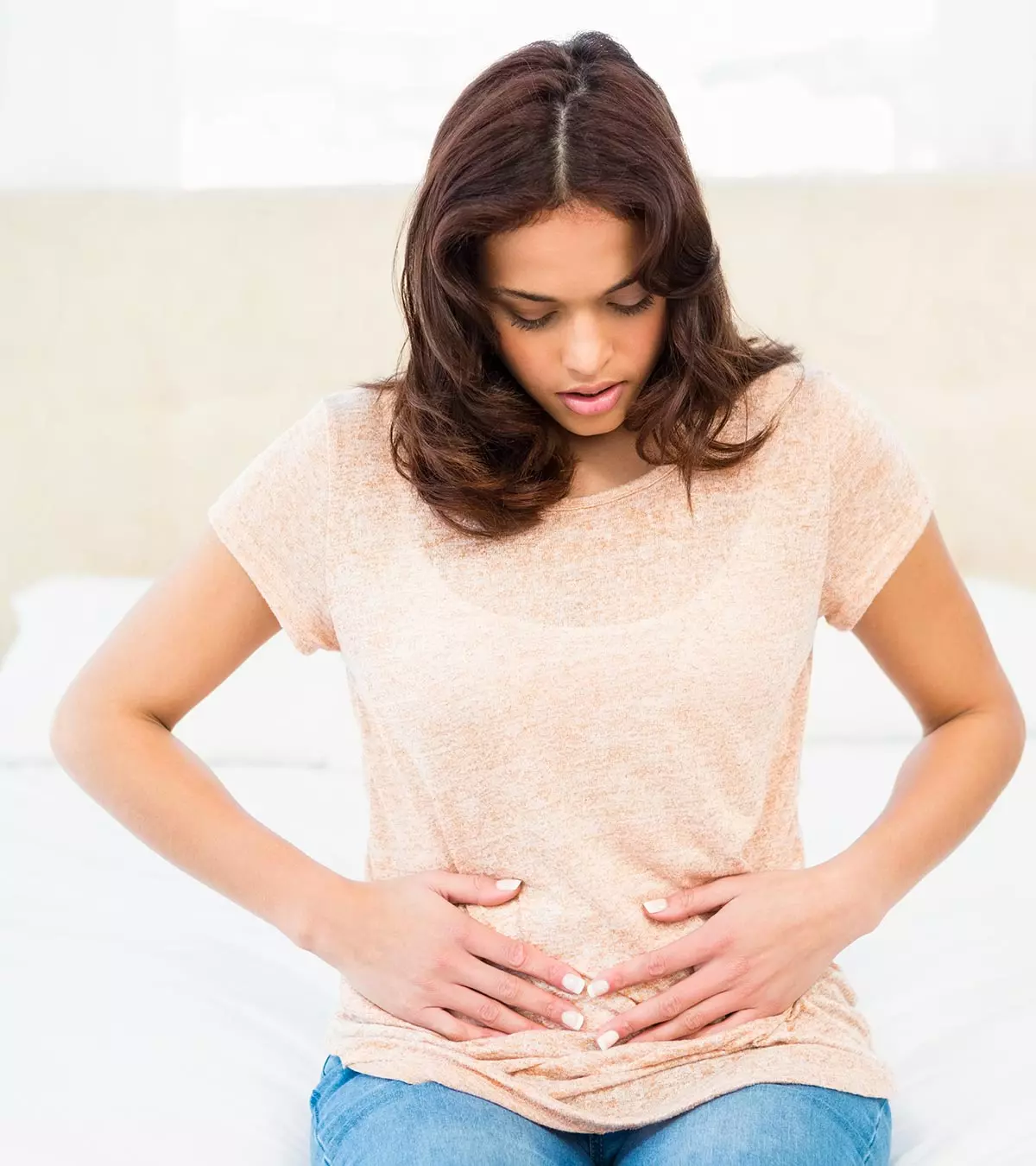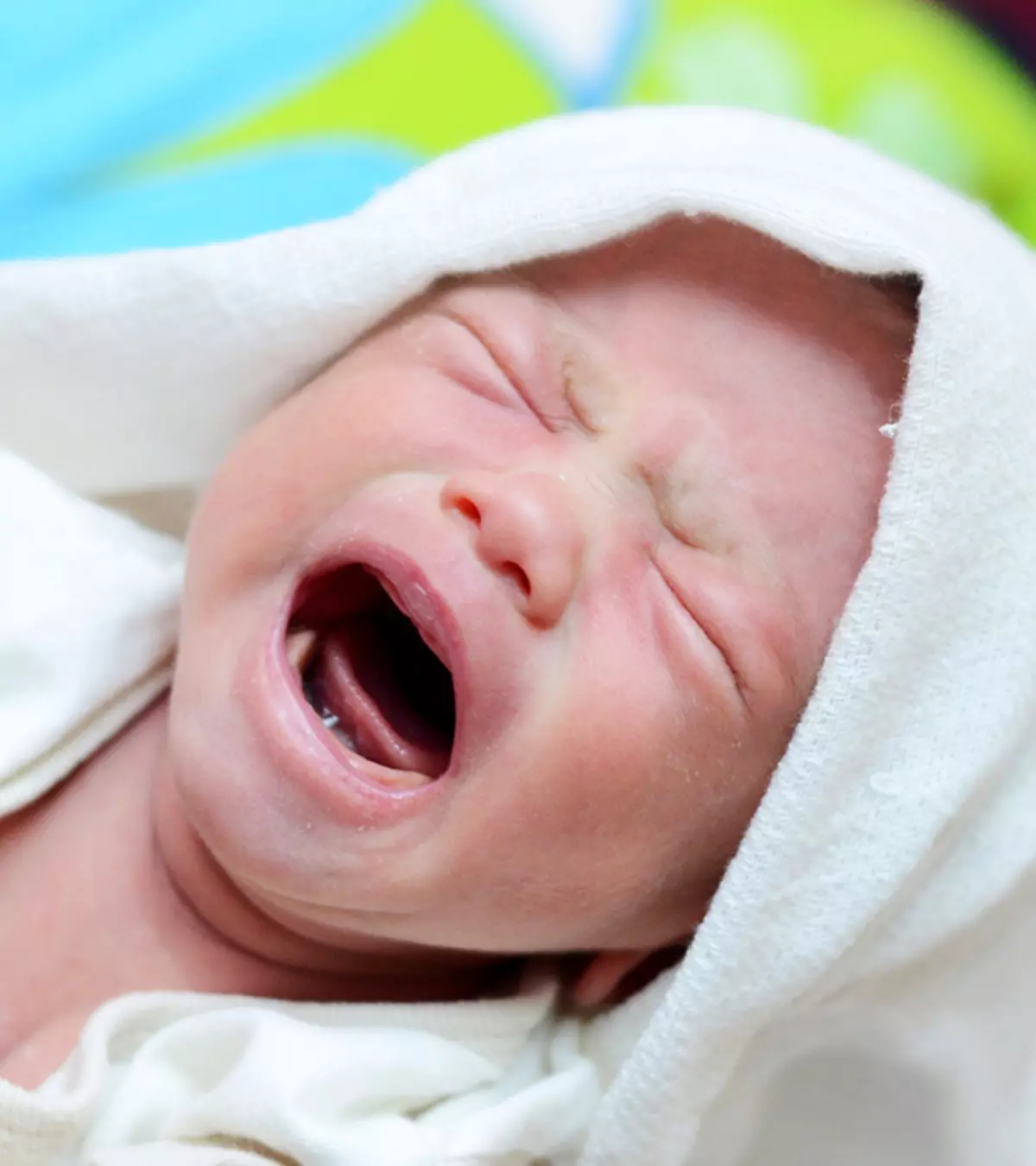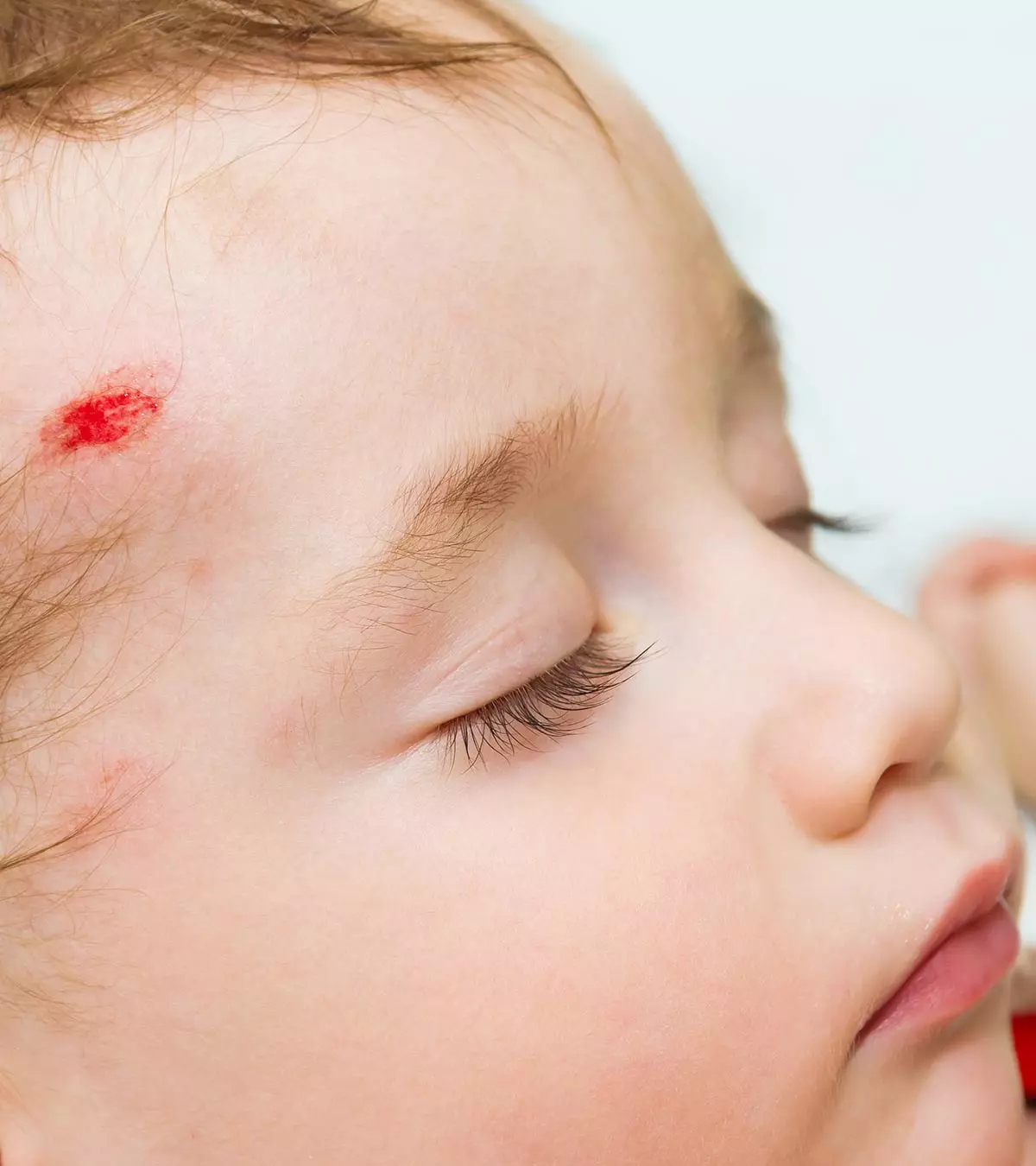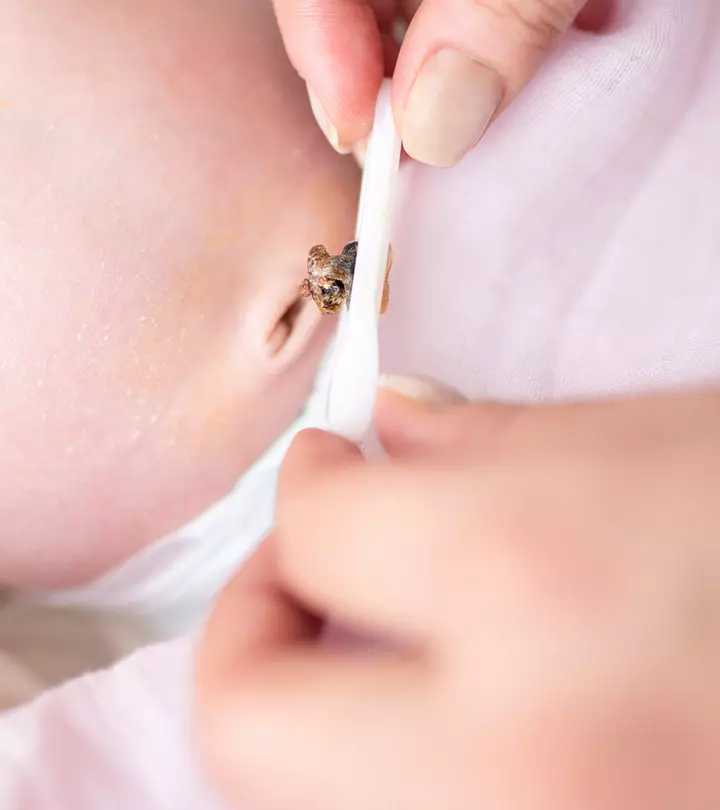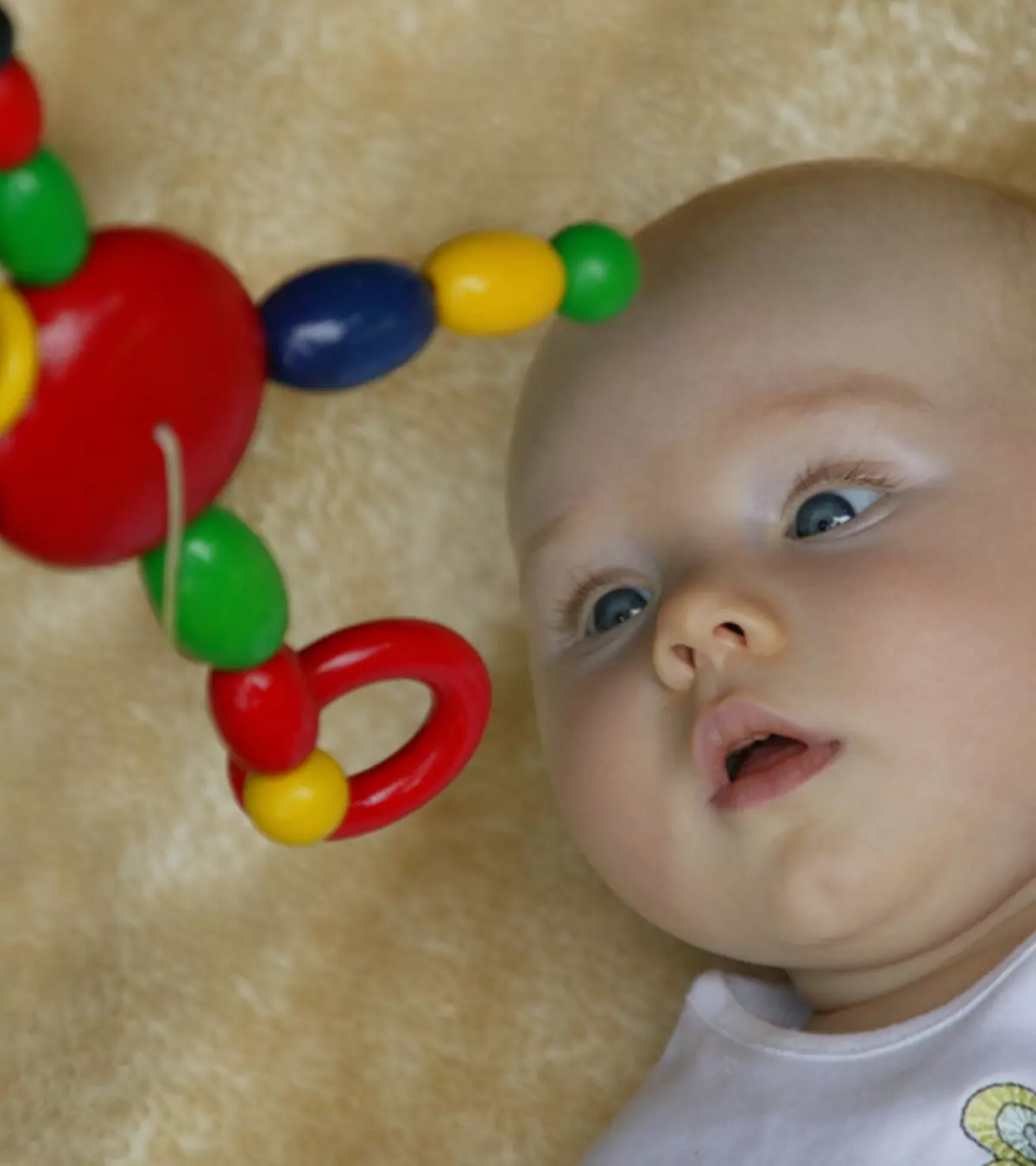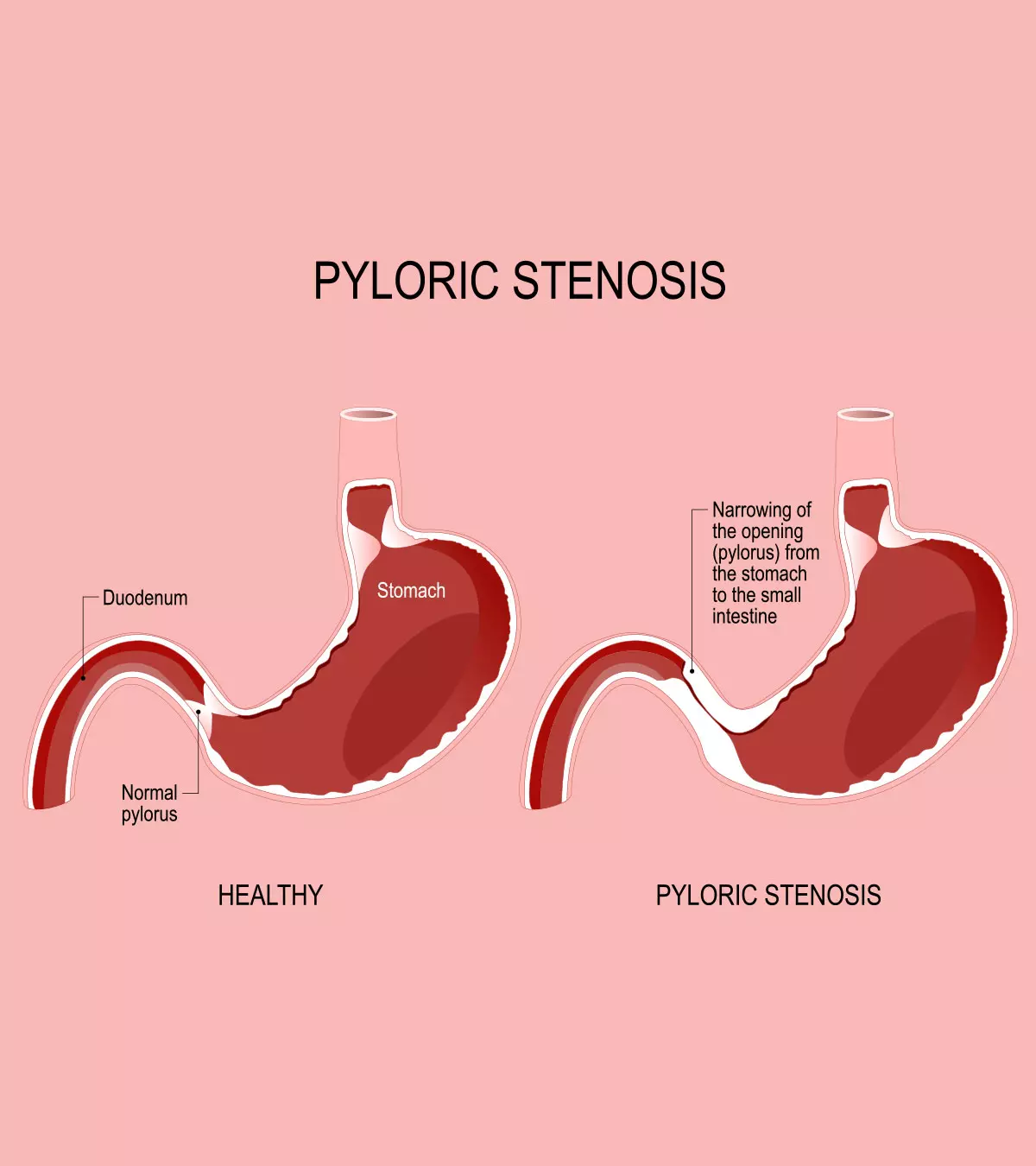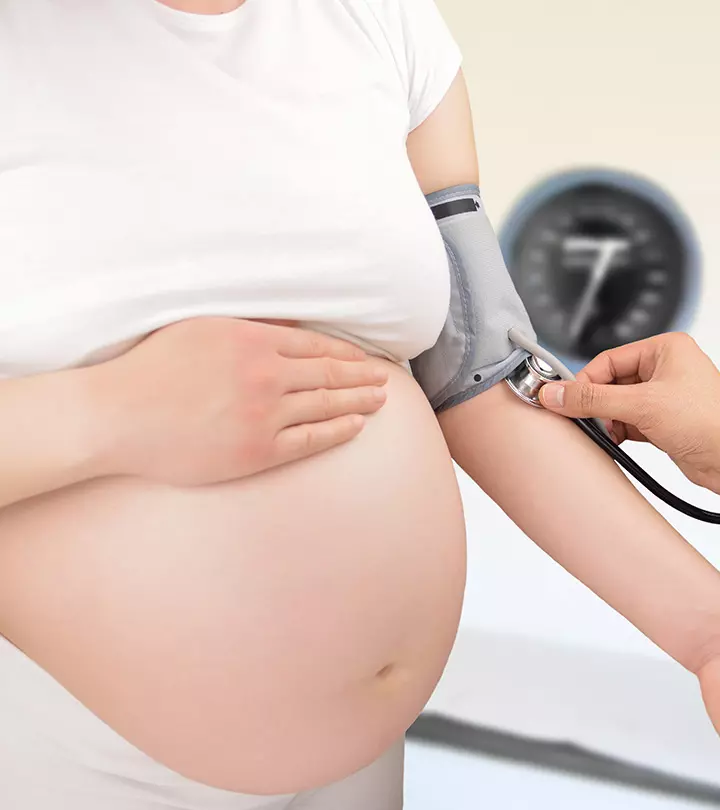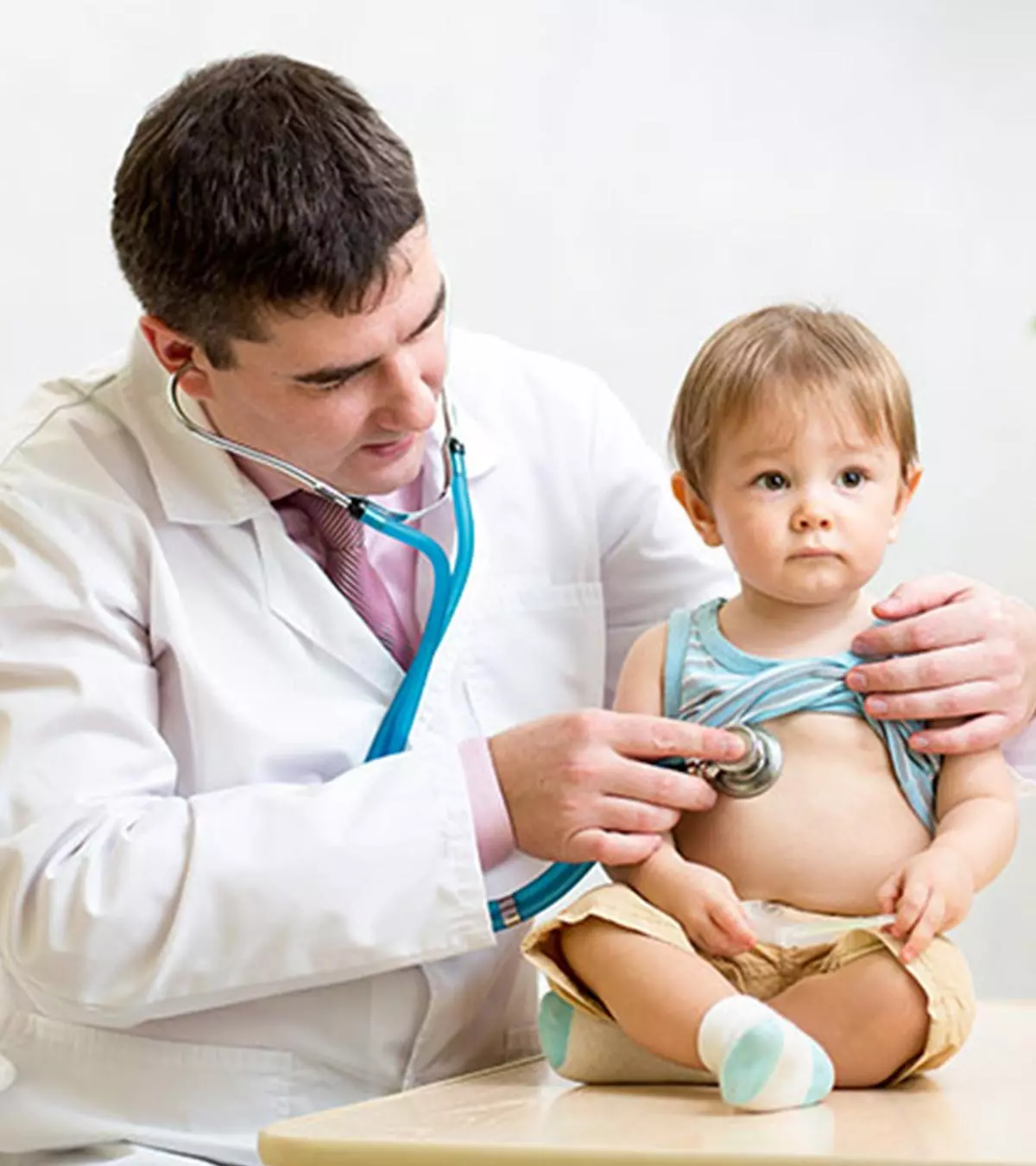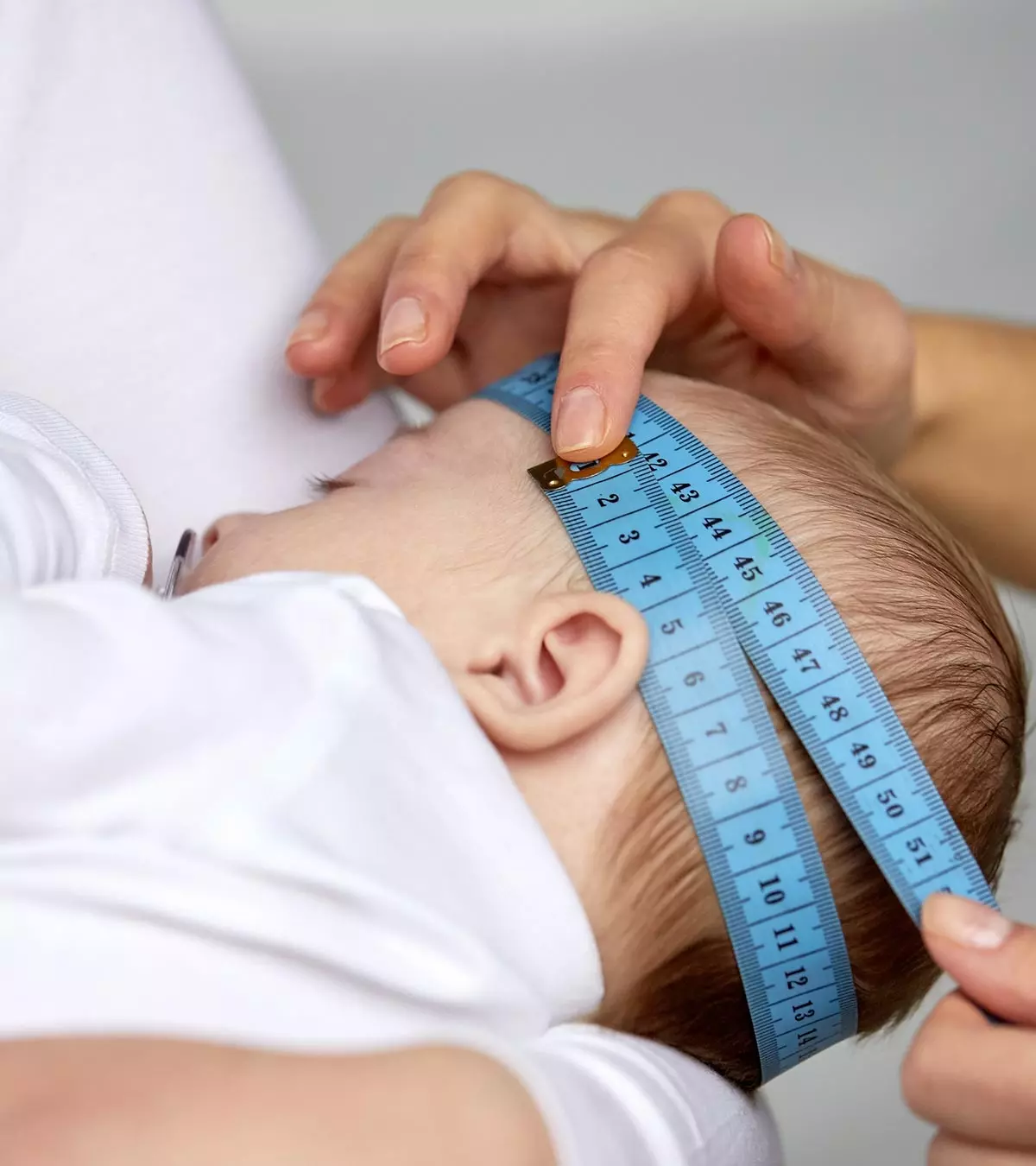
Image: iStock
Butt pain during pregnancy may occur for several reasons, including hormonal changes and pressure from the growing baby. The butt pain is often due to painful stimuli from tissues in the region of the lower back or buttocks. The pain is usually common in the second and third trimesters, but some women may experience butt pain even during early pregnancy (1). If butt pain is persistent or worsens, consult your doctor or midwife to determine the underlying cause. The treatment options may vary from medications to surgery if the cause is severe. Read this post to know the various causes, treatments, and preventive measures for butt pain during pregnancy.

Key Pointers
- Body’s reactions to implantation, hormonal changes, and extreme pressure from the uterus can cause buttock pain in the early weeks of pregnancy.
- Buttock pain may occur in conditions, including constipation, anal fissure, anal abscess, deep gluteal syndrome, or gluteal muscle cramps.
- Seek medical care during a worsening of pain, severe nausea or vomiting, significant bleeding after bowel movements, or buttock pain after an injury.
What Are The Causes Of Buttock Pain During Pregnancy?
The exact cause of sharp pain in the buttocks during pregnancy is difficult to diagnose and may not be pinpointed in some cases. Several theories show that the body’s reactions to implantation, hormonal changes, etc., can cause buttock pain in the early weeks of pregnancy. However, buttock pain could also be due to extreme pressure from the uterus in later months. The causes can be different throughout the pregnancy.
Dr. Alan Lindemann, MD, a former clinical associate professor at the University of North Dakota, says, “You could experience the pain because of an infection in your tailbone. Your colon could also give you trouble, which is more noticeable on your left side. On your right side, you could have appendicitis pain up and back from your non-pregnant location”.
“Softening of the pelvic joints can also cause pain, but it is helpful for the delivery. When you are one year old, your pelvis is five bones instead of one. As you grow into adulthood, these joints become solid, except during pregnancy, when they start to open up in preparation to let your baby come out of your pelvis. The slipping around of these loose joints causes pain. The pain can be strong and come on suddenly, mostly when changing position.”
Common causes of buttock pain in pregnancy may include:
1. Hemorrhoids
Hemorrhoids are swollen, enlarged veins in the rectum and anus. They can develop inside (internal hemorrhoids) and outside (external hemorrhoids or piles) the anus. Approximately 25-35% of pregnant women get affected by hemorrhoids, and nearly 85% of cases occur in the third trimester (2).
Hormonal changes and increased intra-abdominal pressure can predispose pregnant women to develop hemorrhoids. Sometimes, constipation during pregnancy can also lead to hemorrhoids due to strain during bowel movements. Bleeding from the anus, itching, and painful bowel movements are common symptoms of hemorrhoids (3).
2. Sciatica
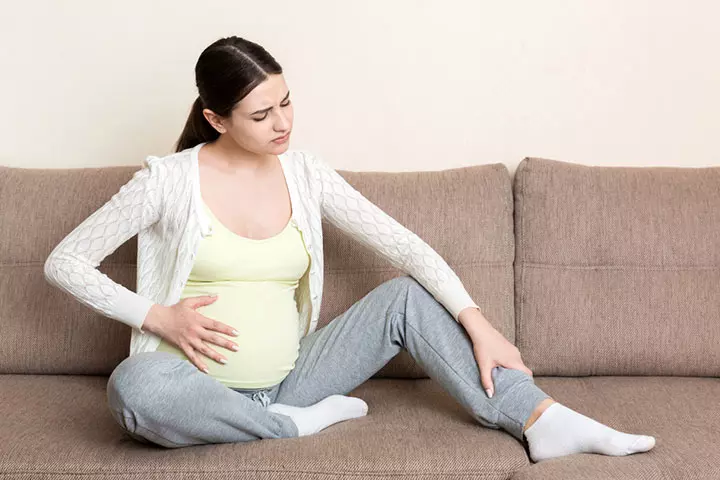
Sciatica is the compression of the sciatic nerve that runs from the butt to the legs and causes shooting pain on the lower back and legs. This is caused by inflammation or pressure on the sciatic nerve, which runs on the lower back, legs, and toes. The pain can be mild or severe and often resolves with treatment or subsides after pregnancy. Although sciatica is common in the third trimester, it can occur anytime during the pregnancy (4). Sciatica does not harm the baby, and it usually disappears after delivery of the baby when the pressure over the nerve is relieved.
Loosening of pelvic ligaments by the effects of the relaxin hormone shifts location of the sciatic nerve and gets pinched, causing pain on the lower back or buttocks and back of the legs. A baby’s weight can put pressure on the sciatic nerve and cause pain and discomfort. The severity of pain may vary depending on the weight and position of the baby (4).
Expressing her discomforts and emotions while dealing with sciatica during her pregnancy, Lindsay Parker, a mother, says, “Sciatica causes pain to shoot through my butt cheek into my lower back. If we are being completely transparent, my pelvis feels like it’s going to break, and my vagina feels like it might rip in half (i).”
However, it is important to note that sciatic nerve pain or sciatica usually resolves on its own after childbirth. Dr. Rebecca Starck, MD, an Ob-Gyn at the Cleveland Clinic, says, “The good news is that sciatica almost always goes away after pregnancy, so try not to stress too much about it now.” She suggests using a full-body pillow that can support the pelvis and lower extremities to help pregnant women sleep (4).
3. Pelvic girdle pain
Pelvic girdle pain, also known as symphysis pubis dysfunction (SPD) or pregnancy-related pelvic pain (PGP), is a collection of uncomfortable symptoms due to a shift of pelvic girdleiRing of bones at the base of the spine around the body joints. Uneven movement of pelvic joints causes pain over the pubic bone, sides of lower back or buttocks, perineum (between vagina and anus), and thighs (5).
Buttock pain due to PGP tends to improve after delivery. However, measures and treatments like being active, taking plenty of rest, changing positions frequently, and physiotherapy are advised to ease discomfort during pregnancy (6). Relaxation techniques are also recommended for women with chronic pelvic pain, back pain, and buttock pain during pregnancy.
Jasmine, a mother of two and a full-time runner, shares her postpartum recovery from PGP during her second pregnancy. She says, “I waited until almost 6 weeks postnatally to attempt any running after Bryn (second child) was born, which is how long it took for my pelvic girdle pain to settle down. In the meantime, I followed advice from the postnatal physiotherapist I had visited after Rowan (first child) was born and worked on my pelvic floor and abdominal muscles (ii).”
 Did you know?
Did you know?4. Labor pains
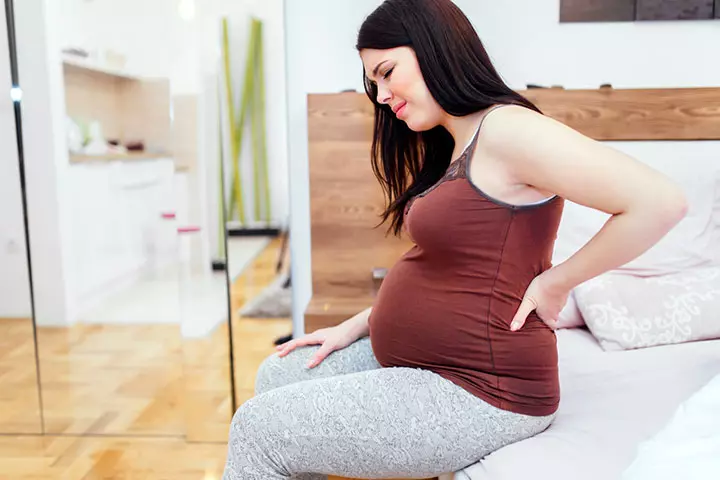
Uterine contractions can cause buttocks to pain during labor in some women; however, they are not the most common symptoms of labor. Some may have only a little discomfort. This pain can also be felt on the abdomen, groin, thighs, and back. Some women may only experience lower abdominal pain during contractions. Labor pain intensity increases with the progressing labor (7).
Sometimes it is possible to have false labor pains such as Braxton Hicks contractions in the second and third trimesters. True labor contractions follow the 5-1-1 rule during early labor: contractions every five minutes lasting one minute for at least one hour (8). You may also notice other signs of delivery, such as water breaks followed by true contractions.
Although not specific to pregnancy, buttock and tailbone pain may occur in the following conditions (9) (10) (11):
- Constipation
- Anal fissure (tear in the anus) and anal abscess (pus-filled cavity)
- Deep gluteal syndrome when the muscles, blood vessels, and skin in the buttocks press the nerves (12)
- Piriformis syndrome occurs when the piriformis muscleiA flat, pear-shaped muscle in the buttocks that helps in hip rotation and leg extension. in the buttock press the sciatic nerves
- Certain activities and injuries such as tailbone fracture or strains
- Gluteal muscle cramps
- Tendon inflammation (tendinitis)
- Hip arthritisiCondition due to cartilage damage in the hip joint causing pain and stiffness.
- Bursitis (inflammation of joint cushions)
- Pilonidal cysts (sacs on the tailbone with pus)
- Shingles caused by chickenpox virus reactivation(13)
These conditions are treated with conservative measures, medicines, or surgeries depending on the severity. A healthcare provider should evaluate buttock pain in pregnancy to rule out serious causes.
When To Consult A Doctor?
Although not harmful, it is recommended to seek medical care since pregnancy-related buttock pain can be uncomfortable. Immediate medical attention for buttock pain is recommended in the following scenarios:
- Bladder or bowel incontinence
- Numbness with pain
- Trouble to control foot
- Difficulty in moving
You may also seek medical care for buttock pain during pregnancy in the following situations:
- Worsening of pain
- Feels like uterus contractions
- Severe pain with nausea or vomiting
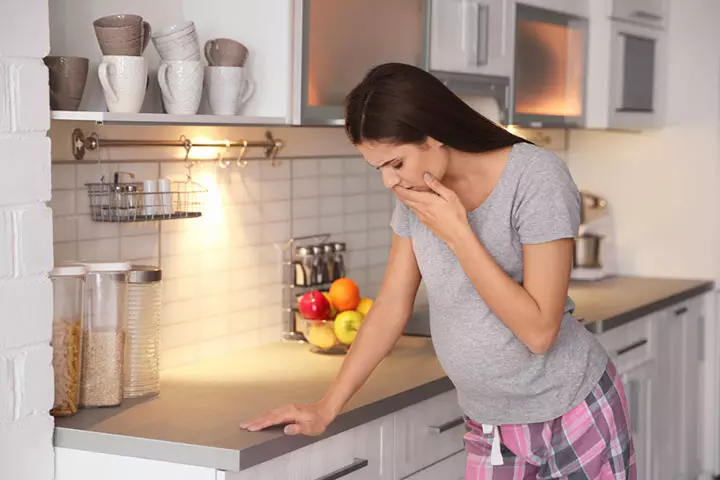
- Pain is not improved after conservative management with dietary and lifestyle and dietary changes
- OTC medications do not relieve pain
- Significant bleeding after a bowel movement
- Fever, unusual swelling, or bleeding
- Buttock pain begins after an injury
Always seek medical advice if you are concerned about any symptoms during pregnancy. Take your doctor’s suggestion before taking any medications including herbal remedies in pregnancy.
How Is Buttock Pain In Pregnancy Diagnosed?
Doctors may obtain medical history, ask for details of location, intensity, other pain characteristics, associated symptoms, and perform certain physical examinations to identify the cause of hip pain in pregnancy. In addition, some women are referred to hip surgeons or orthopedic spine specialists for a detailed evaluation.
Sometimes doctors may recommend measures to help reduce hip joint pain and some treatments without any scans. Diagnostic tests are ordered only if the pain is associated with warning symptoms such as tingling, numbness, vaginal discharge, or bleeding.
How Is Buttock Pain Treated During Pregnancy?
The treatment for buttock pain depends on the cause. Doctors may recommend conservative measures to help reduce pain not to harm the baby, and the pain usually resolves after delivery.
Conservative management and medical treatments for buttock pain in pregnancy may include (3) (14) (15):
- Try over-the-counter pain medications such as acetaminophen (Tylenol) as per doctors’ suggestions. Avoid NSAIDs and other pain relievers during pregnancy without prescription.
- Apply topical pain relief (analgesic) creams, ointments, or suppositories for severe pain in hemorrhoids. However, ensure to consult your doctor before using them.
- Use stool softeners as per the doctor’s advice for hemorrhoid-related buttock pain.
- Use sitz baths and warm water showers to help reduce buttock pain.
- Try physiotherapy, including strengthening exercises, water exercises, and transcutaneous electrical nerve stimulation (TENS) to help alleviate pain (16).
- Use equipment such as maternity support belts and crutches to help relieve buttock pain due to PGP (5).
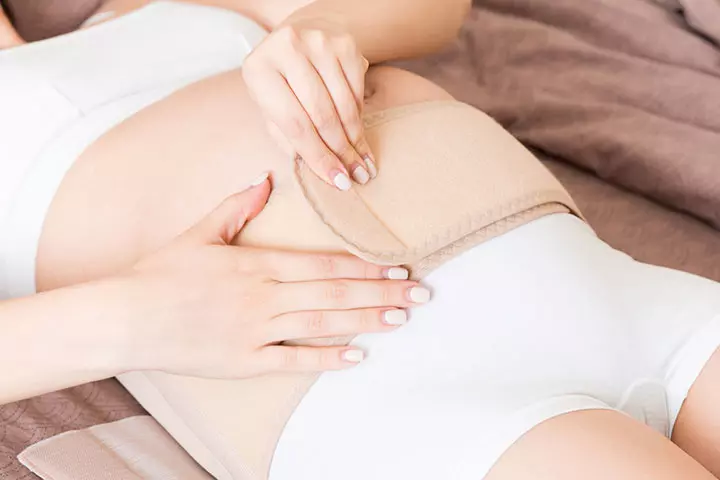
- Try comfort measures including massages, tubs, showers, cold or hot compress, and birth ball and mental strategies such as music and other relaxation techniques to manage labor pain (17).
- Opt for pharmacological options such as inhalation of nitrous oxide, intravenous opioid injections, and local anesthetics to help reduce severe labor pain, only if indicated by your doctor or during your stay at the hospital (17).
- A doctor or midwife may recommend epidural block or spinal analgesia to numb specific body areas for labor pain relief (17).
- Discontinue any activities causing or worsening sciatic pain
- Pregnancy pillows are recommended for sleeping and massaging.
Trying herbal remedies such as witch-hazel, grape extract, and various other products may help reduce pain in some women. However, there is no evidence from randomized controlled trials on the safety of many alternative medicines during pregnancy, including these medications, and so are not recommended.
What Exercises May Help Alleviate Butt Pain During Pregnancy?
Some exercises and stretches can help alleviate your buttocks and tailbone pain during pregnancy. These may include:
1. 4-point kneeling
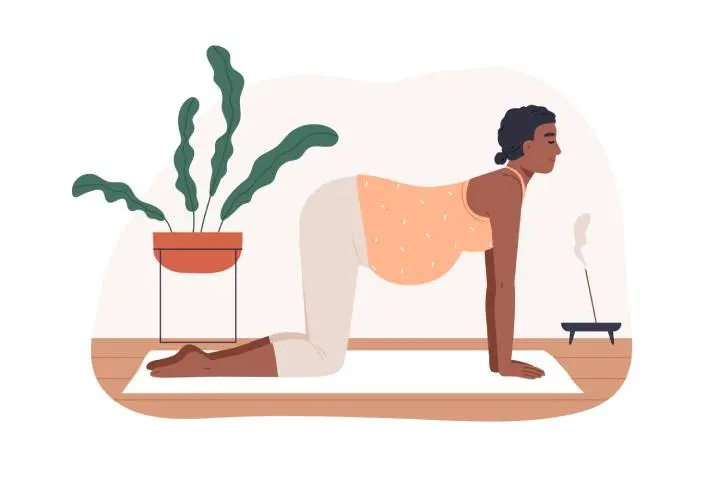
This pelvic floor stretching exercise requires you to get on your hands and knees. Ensure you position your hip directly over your knees and your shoulders over your hands. Also, ensure that your weight is evenly distributed to your hands and knees. Try to tilt your hips forward gently while rounding your back; hold for a few seconds and relax again. This exercise will help relieve back pain, sciatic pain, and PGP (18).
2. Leg and arm lift
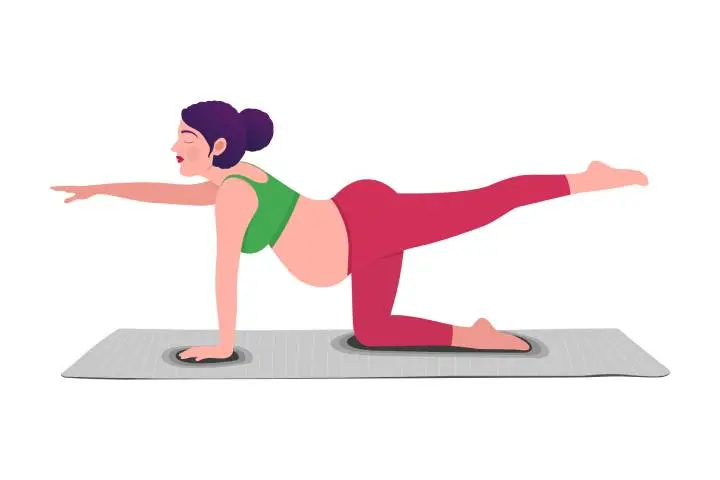
It is also known as the Bird Dog extension. You need to raise your alternative arm and leg in this pose while holding the 4-point kneeling pose. Try extending one arm at a time, followed by extending one leg at a time. If you feel you can combine alternative arm-leg extensions together, go ahead (18).
3. Child’s pose
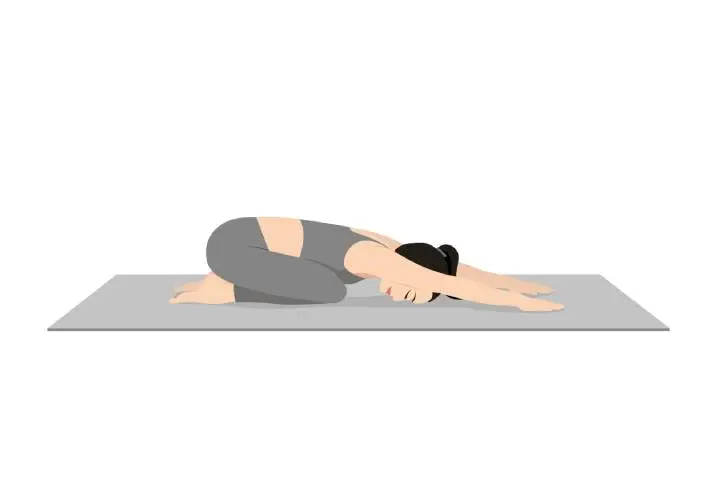
This pelvic floor exercise can also help prepare the body for childbirth. First, sit on your heels, followed by slowly leaning forward with your arms straight out in front of you. Rest your elbows on the ground in front of you, and use your hand to support your head. Make sure to breathe deeply. As your belly grows, you can ask your therapist for tailored positioning (19).
4. Pelvic bridge
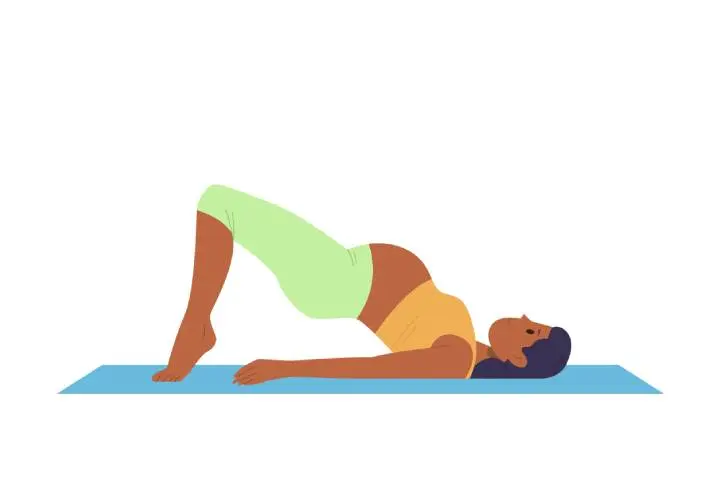
It is also known as the Glute Bridge or Back Bridge position. This exercise can help relieve tailbone pain. First, lie on your back on the floor. Bend your knees and keep your feet flat on the floor. Now, slowly lift your hips off the floor while keeping your abdominal muscles tightened; hold for a few seconds; return to the starting position and repeat (20).
5. Static gluteal exercises
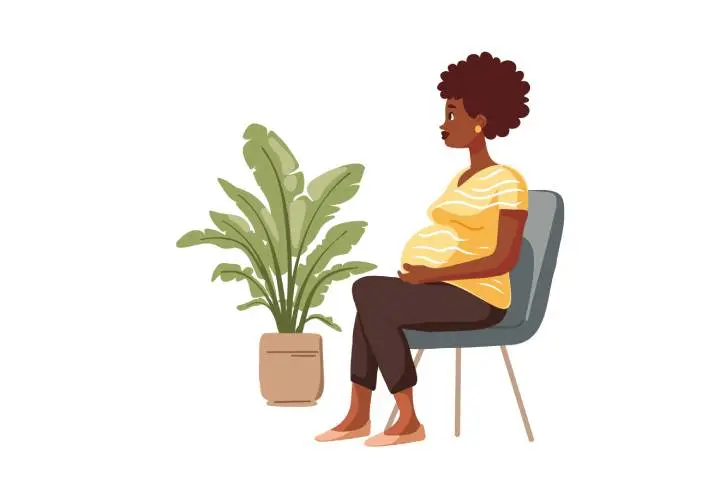
This easy exercise can help with our pelvic and anal pain during pregnancy. In this exercise, you need to squeeze your buttocks together while breathing normally. Hold on for a few seconds and release the tension. Repeat this ten times. You can do this simple exercise while sitting on a chair, standing, or lying down (21). It can be helpful for women who are in their last few weeks or months of pregnancy.
Remember to listen to your body when exercising; do not overexert yourselves. Also, consult with your doctor and physiotherapist for personalized guidance before doing any exercise, especially if you have a complicated pregnancy.
How To Prevent Buttock Pain During Pregnancy?
Dr. Lindemann suggests, “At night you should keep your knees side-by-side. You will have more pain if one knee is up and the other down. With knees in separate locations, your pelvis will twist, pulling the loose joints further apart and causing pain.”
Although not all causes of buttock pain are not preventable in pregnancy, the following measures may help avoid some causes (5) (15) (22):
- Avoid prolonged sitting. If possible, try to use a standing desk in the office. You may switch between standing and sitting positions to help reduce pressure on your buttocks. Make sure to put equal pressure on both legs when standing.
 Experts say
Experts say- Use coccyx seat cushions or donut pillows on the chair to help reduce pressure on the anal region while sitting. You may also use chairs with proper back support and a footrest to increase comfort and minimize coccyx or tailbone pain during pregnancy.
- While sleeping, using extra pillows or special pillows like wedge-shaped cushions with a cutout for the tailbone region can help. Sleeping opposite to the side of pain can also help.
- Be mindful of your sitting posture. Avoid slumping forward when sitting, especially if you are sitting in a chair, ensure that your feet are flat on the ground.
- Stay active by stretching your legs, walking around, and getting up often to help prevent the risk of buttock pain from continuous sitting. However, avoid going up and down the stairs too often.

- Apply cold or hot packs or compress to ease the pain. This may also increase the blood flow and heal the pain and inflammation. Do not apply an ice pack for more than 10 to 15 minutes at a time.
- Follow a gentle exercise routine or try prenatal yoga to stretch and relax your back muscles for pain relief.
- Drink enough water and consume fiber-rich foods to maintain optimum prenatal health and also constipation during pregnancy.
- Avoid lifting heavy objects as it can put additional pressure on your spine and anal region.
- Continue swimming if you have been swimming before pregnancy. The water pressure can help relieve the pressure on the sciatic nerve.
Butt pain during pregnancy may be caused by hormonal changes, hemorrhoids, labor pains, and more. Although the condition does not cause any worry in most cases, you should consult a doctor if you experience numbness with pain, nausea, and vomiting. Doctors generally do not suggest diagnostic tests until you have other symptoms such as vaginal bleeding or numbness. Treatment is based on individual cases. After diagnosis, doctors may suggest pain-relief medications, stool softeners, or physiotherapy. Avoid sitting for long and exercise regularly to prevent buttock pain during pregnancy.
Frequently Asked Questions
1. Can too much sitting cause buttock pain?
Sitting for too long may cause buttock pain. Experts often refer to it as the dead butt syndrome, technically known as gluteal amnesia. Gluteal amnesia is when the rear muscles forget to stabilize the pelvis and work on body alignment (23).
2. What helps sciatic pain in the butt during pregnancy?
Pregnant women with sciatica pain in the butt can do light back stretches to relieve pain. Massaging the back and using a foam roller for the buttocks are other ways to alleviate buttock pain. If the pain turns severe, women can consult their healthcare provider and take a pregnancy-safe over-the-counter pain killer (24).
3. What kind of stretching can help relieve butt pain during pregnancy?
If the pain is caused by sciatica, stretching exercises such as seated piriformis stretch, child’s pose, and standing hamstring stretch can help relieve butt pain during pregnancy (24).
Infographic: Sit Right To Avoid Butt Pain When Pregnant
Maintaining the correct sitting posture is essential to avoid back and butt pain during pregnancy. Try the tips in this infographic to prevent butt pain during pregnancy while at home or work.
Some thing wrong with infographic shortcode. please verify shortcode syntax
Illustration: Butt Pain During Pregnancy: Causes Diagnosis And Treatment

Image: Dall·E/MomJunction Design Team
If you’re pregnant and suffering from sciatica, watch this helpful video. Discover useful methods for relieving the pain of sciatica during pregnancy.
Personal Experience: Source
MomJunction articles include first-hand experiences to provide you with better insights through real-life narratives. Here are the sources of personal accounts referenced in this article.
i. I’m pregnant and definitely not glowing.https://medium.com/coffee-house-writers/im-pregnant-and-definitely-not-glowing-60913e4c7cfc
ii. Bump and Baby, Second Time Around.
http://jasminfellrunner.blogspot.com/2025/02/bump-and-baby-second-time-around.html
References
- PREGNANCY….A PAIN IN THE BUM?!
https://www.physio-form.co.uk/article/pregnancya-pain-in-the-bum - Arthur Staroselsky, et al; (2008); Hemorrhoids in pregnancy.
https://www.ncbi.nlm.nih.gov/pmc/articles/PMC2278306/ - Hemorrhoids During Pregnancy.
https://my.clevelandclinic.org/health/diseases/23498-pregnancy-hemorrhoids - How to handle sciatica during your pregnancy.
https://health.clevelandclinic.org/how-to-handle-sciatica-during-your-pregnancy - Pelvic pain in pregnancy.
https://www.nhs.uk/pregnancy/related-conditions/common-symptoms/pelvic-pain/ - Pelvic girdle pain and pregnancy.
https://www.rcog.org.uk/for-the-public/browse-our-patient-information/pelvic-girdle-pain-and-pregnancy/ - Labor pain basics.
https://nationalpartnership.org/childbirthconnection/giving-birth/labor-pain/basics/ - False alarm: Braxton Hicks contractions vs. true labor.
https://utswmed.org/medblog/braxton-hicks-contractions/ - Tailbone Pain (Coccydynia).
https://my.clevelandclinic.org/health/diseases/10436-coccydynia-tailbone-pain - Pain in buttocks: Why and What to do?
https://elevatephysio.com.sg/pain-in-buttocks-why-and-what-to-do/ - Anal pain (proctalgia).
https://www.nidirect.gov.uk/conditions/anal-pain-proctalgia - Luis Perez Carro et al.; (2016); Deep gluteal space problems: piriformis syndrome, ischiofemoral impingement and sciatic nerve release.
https://pmc.ncbi.nlm.nih.gov/articles/PMC5193530/ - Can You Get Shingles On Buttocks? Everything You Should Know.
https://healthmatch.io/shingles/shingles-on-buttocks#symptoms-of-shingles - Self-care Techniques May Help Relieve Discomfort from Buttock Pain.
https://newsnetwork.mayoclinic.org/discussion/self-care-techniques-may-help-relieve-discomfort-from-buttock-pain/ - What to do when pregnancy becomes a pain in the tailbone.
https://utswmed.org/medblog/tailbone-pain-during-pregnancy/ - Annelie Gutke et al.; (2015); Treatments for pregnancy-related lumbopelvic pain: a systematic review of physiotherapy modalities.
https://obgyn.onlinelibrary.wiley.com/doi/10.1111/aogs.12681 - Labor Pain Relief.
https://my.clevelandclinic.org/health/articles/4450-labor-pain-relief - Pregnancy exercises to strengthen your pelvic floor.
https://www.osfhealthcare.org/blog/pregnancy-exercises-to-strengthen-your-pelvic-floor/ - 5 exercises and techniques to train for childbirth.
https://utswmed.org/medblog/prepare-body-labor-delivery/ - Fit for Two: Navigating Third Trimester Training for Prenatal Clients.
https://www.acefitness.org/continuing-education/certified/april-2025/8616/fit-for-two-navigating-third-trimester-training-for-prenatal-clients/?srsltid=AfmBOopqpd5HHgDqUvSjzwl4KOzd_3Tla5KXQ3qruuFHp_axqsUcztIE - Pelvic Health Physiotherapy Antenatal Advice for Women Experiencing Back or Pelvic Pain.
https://www.esht.nhs.uk/wp-content/uploads/2025/07/0832.pdf - Sciatic Nerve Pain During Pregnancy.
https://www.lancastergeneralhealth.org/health-hub-home/motherhood/your-pregnancy/sciatic-nerve-pain-during-pregnancy - Are You at Risk for Dead Butt Syndrome?
https://www.michiganmedicine.org/wellness-prevention/are-you-at-risk-for-dead-butt-syndrome - Sciatic Nerve Pain During Pregnancy? Here’s What to Do.
https://rmccares.org/2025/01/14/sciatic-nerve-pain-during-pregnancy-heres-what-to-do/
Community Experiences
Join the conversation and become a part of our nurturing community! Share your stories, experiences, and insights to connect with fellow parents.
Read full bio of Dr. Karla S. Sanchez-Banos
- Dr. Alan Lindemann is an obstetrician and maternal mortality expert, who worked as a clinical associate professor at the University of ND. An alumnus of the University of ND and the University of Minnesota, he is a member of the American College of Obstetricians and Gynecologists and the American Medical Association.
 Dr. Alan Lindemann is an obstetrician and maternal mortality expert, who worked as a clinical associate professor at the University of ND. An alumnus of the University of ND and the University of Minnesota, he is a member of the American College of Obstetricians and Gynecologists and the American Medical Association.
Dr. Alan Lindemann is an obstetrician and maternal mortality expert, who worked as a clinical associate professor at the University of ND. An alumnus of the University of ND and the University of Minnesota, he is a member of the American College of Obstetricians and Gynecologists and the American Medical Association.
Read full bio of Dr Bisny T. Joseph
Read full bio of Rebecca Malachi
Read full bio of Reshmi Das







